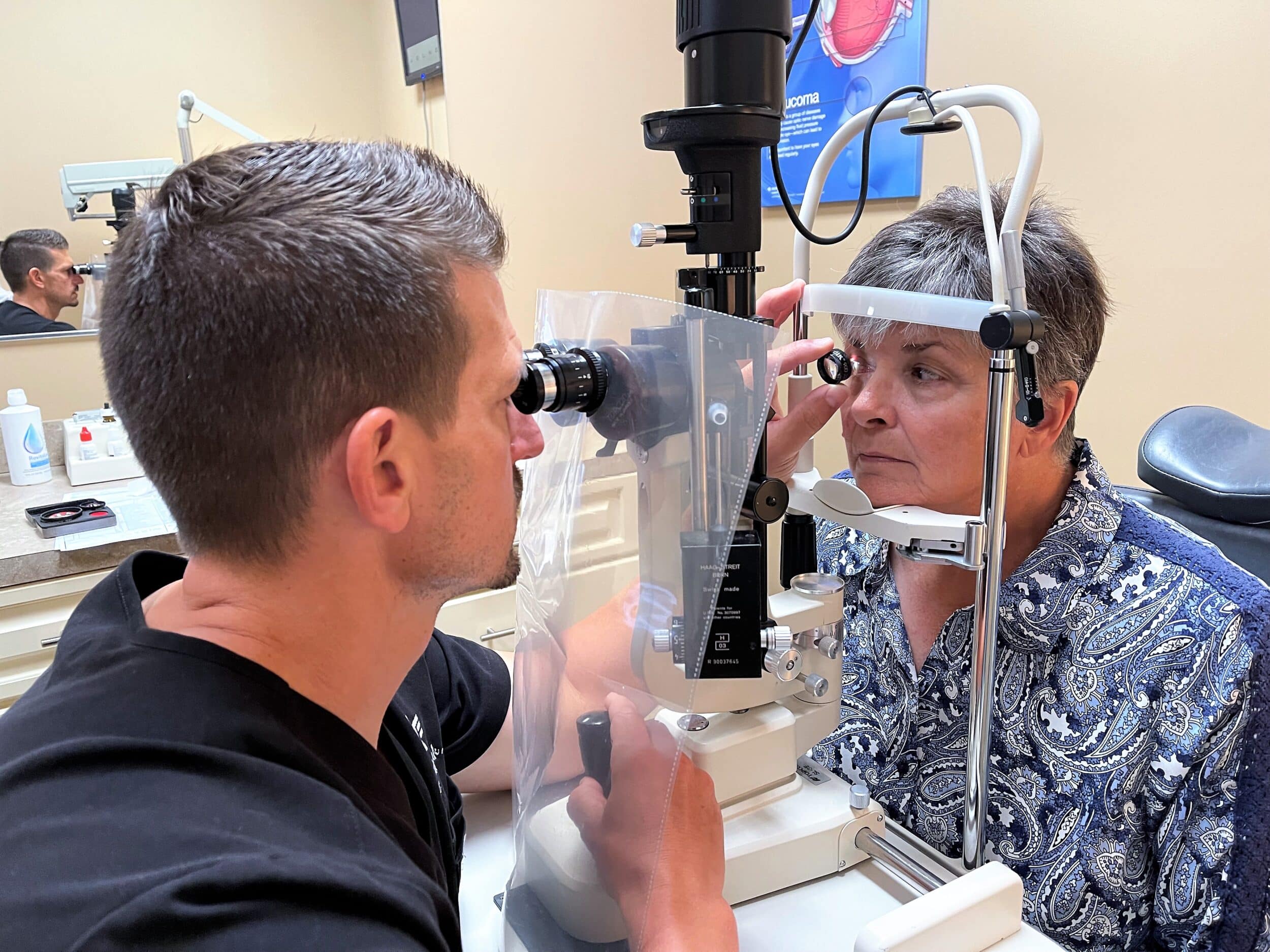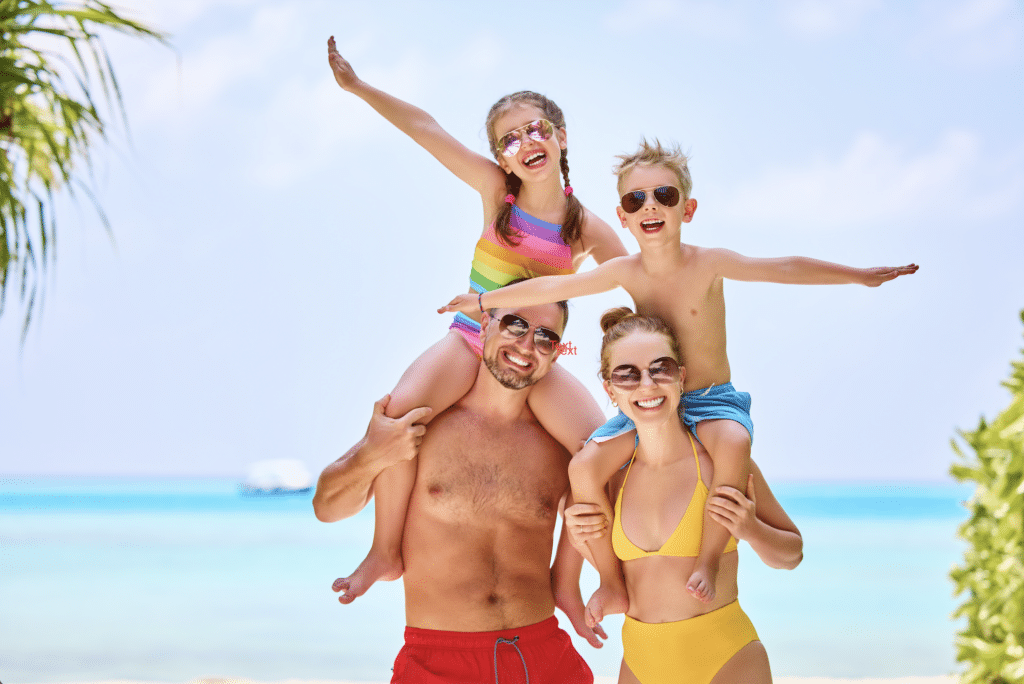As the old Gershwin tune goes, it’s “summertime, and the living is easy.” Presumably, a white sand beach somewhere is calling your name-time to hunch under a shady umbrella with a good book, scrounge the shore for seashells, or take a dip in the waves.
All after slathering yourself in sunscreen, of course-too much sun not only causes nasty burns, but it may also increase your risk of skin cancer.
Unfortunately, the threat of excessive sun exposure to your health isn’t limited to your skin-the ultraviolet (UV) rays of the sun can also injure your eyes.

Excessive UV exposure can cause a condition called photokeratitis, or ‘sunburn of the eye,'” says Dr. Scott Paladichuk, a Therapeutic Certified Optometrist with Hattiesburg Eye Clinic. “This typically results in temporary discomfort, redness, blurred vision, tearing and sensitivity to light. You may also develop abnormal tissue growth on the whites of the eyes called pterygium that could interfere with vision.”
But that’s not all of the possible complications to your eyes from UV exposure-it could also accelerate the development of cataracts, the clouding over of the eye’s natural lenses. Additionally, too much UV can also contribute to age-related macular degeneration (AMD), in which a person loses the central core of their vision.
And just like with the skin, years of too much sun could increase your odds of eye cancer.
“Excessive exposure to UV rays, particularly UV-B and UV-C, increase a person’s risk for various types of eye and eyelid cancers, including basal cell carcinoma, squamous cell carcinoma, and melanoma,” says Dr. Paladichuk.
It’s enough to make you want to stay indoors. Fortunately, though, you don’t have to-if you take a few precautions while out in the sun.
In recognition of UV Safety Awareness Month this July, here are 4 tips from Dr. Paladichuk and Hattiesburg Eye Clinic to protect your eyes while outdoors.
- Wear sunglasses. A good pair of sunglasses is your primary protection against UV
exposure-and by “good,” Dr. Paladichuk means glasses designed to block UV rays.“A lot of people think if their lenses are polarized, that’s enough,” says Dr. Paladichuk. “But while polarization can reduce and increase comfort and clarity, by itself it won’t block UV rays.”
Instead, he says only choose sunglasses that provide 100% UV protection: Look for labels stating the eyewear meets American National Standards Institute (ANSI) UV Protection standards for both UVA and UVB rays. Additionally, “wraparound” frames can protect the eyes from rays entering in from the sides. - Wear a hat. Besides adding welcome shade, a hat can also boost the protection provided by your sunglasses.
“The added protection of a hat is especially important for children and seniors. Broad-brimmed hats are best,” says Dr. Paladichuk.
A hat’s color and material can also make a difference. Choose dark or bright colors, as they tend to shield your eyes from UV rays better than lighter shades. And, tightly-woven, cotton fabric hats offer more protection that thinner forms of material. - Do the same on cloudy days. Dr. Paladichuk says that just because the sun’s visible light is “hiding” behind a few clouds, that doesn’t mean its UV rays are blocked as well.
“Clouds can’t block UV light, which can pass right through haze and clouds. In fact, some types of clouds may intensify UV radiation by reflecting and scattering it.”
Although it may seem counterintuitive, be sure you’re wearing sunglasses and other protection even on overcast
days. - …And, in tanning beds. Well, maybe not a hat, but you should still wear appropriate eye
protection. “Tanning bed light emits UV rays, and poses the same risks to your eyes and body as outdoor sunlight,” says Dr. Paladichuk. “It’s always important to wear approved eyewear, and follow other safety guidelines, while using a tanning bed.
And, here’s a bonus tip, though it’s a bit of common sense: Avoid looking directly at the sun. “Staring at the sun for even short periods of time-even during an eclipse-could damage your retina and lead to vision impairment or even blindness,” says Dr. Paladichuk.
Time in the sun does have its benefits: Besides improving your mental outlook, sunlight (as a major source of vitamin D) could also boost your immune system. Even so, too much of anything, even a lovely, sunny day at the beach, can be detrimental.
So, go ahead and get your summertime dose of outdoor fun. Just be sure to follow Dr. Paladichuk’s advice for protecting your eyes from harmful UV rays.
To learn more about protecting your vision visit us at our website. To learn more about how Hattiesburg Eye Clinic can improve your vision health, call 601-268-5910 (or toll-free 800-624-8254) or schedule a consultation with us at www.hattiesburgeyeclinic.com/contact-us/

